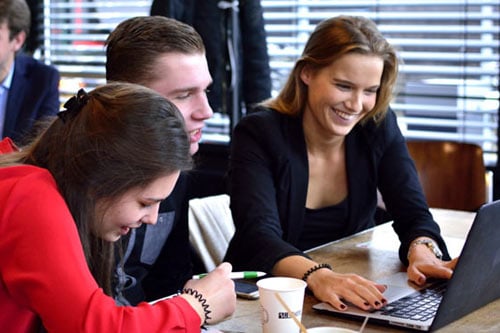In this strategic international business simulation, students act as the management of an international bicycle company. Students compete in four of the largest emerging markets, which include Brazil, Russia, India and China, or otherwise known as the BRIC markets. The student teams compete against one another in these highly competitive market environments. In each round they must complete an internal and external analysis, determine their strategic focus and take operational decisions for all departments of their companies. While also analysing the markets and news items in order to make decisions that give them the upper hand over their competitors.
Once the students have been placed in teams, they may decide on their company name and divide roles between themselves. This can be achieved in different ways, members can either choose to be in charge of a specific department such as marketing, HRM, finance or purchasing and distribution. Alternatively tasks can also be divided geographically, with each student focusing on one of the BRIC markets.
Students must take their operational decisions in line with their chosen strategy to outperform those who compete in the same market segments. Their performance is then measured by the Balanced Scorecard with each team (company) ranked using a 'stock exchange' valuation.
The simulation game offers a wide variety of different strategic modules that can be added, removed or placed in a certain sequence in line with the module’s weekly teaching subjects. For example if you are teaching SWOT and PESTEL in week 1, and BCG and CSR strategy in week 2, then our account managers will implement those strategic options in the same weeks of the simulation. Other international business elements that can also be added include subjects such as Porter's Five Forces and Ansoff's Growth Strategy, as well as a range of other modules that can be added. This simulation allows students to apply the tools and theories that you have introduced to them and put them into practise.
The Emerging markets simulation is usually assessed in several ways. Below you will find the most popular options:
Analysis
Values and Objectives
Would you like to know more about this management game?
| Features | |
|---|---|
| Student levels: | All UG students |
| Languages: | |
In a management game, theoretical models are put into practice. Management games give participants a unique experience in which mutual collaboration, analytical thinking and insight into complex and dynamic relationships are important learning effects.
Contact
Over ons
Ons team
Vacatures
Auteur worden
Jan van Nassaustraat 113
2596 BS Den Haag
070-3600510
Stay up to date with our latest updates
We regularly publish and launch new titles and innovative learning products. Want to stay informed about the latest developments? Sign up for our newsletter.
 Een businessgame
Een businessgame Een Edubook
Een Edubook
vraag ontvangen
We hebben uw vraag ontvangen en we zullen op werkdagen binnen 24 uur bij u terugkomen.